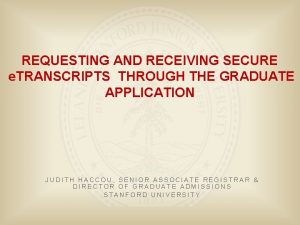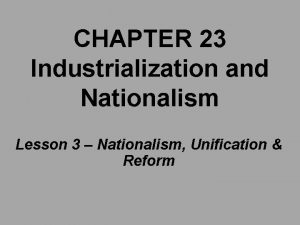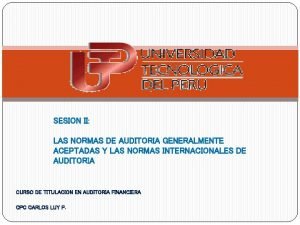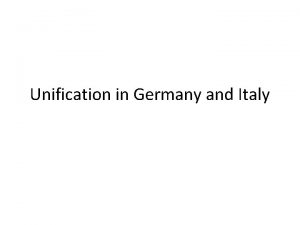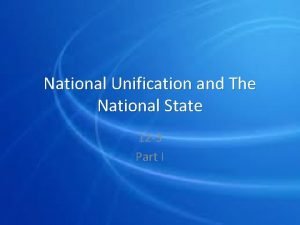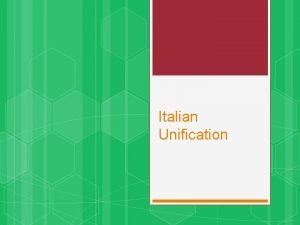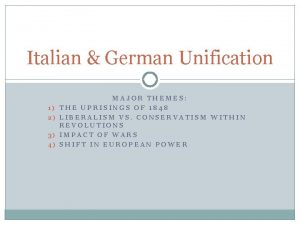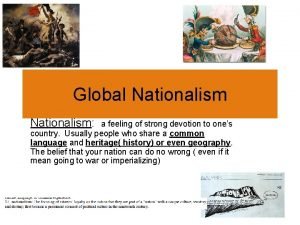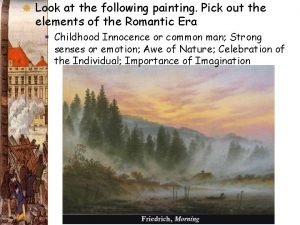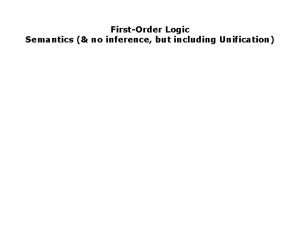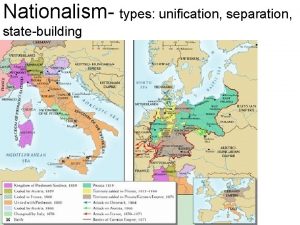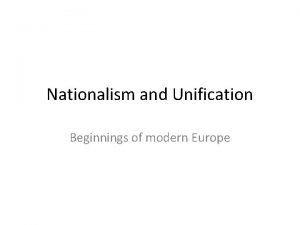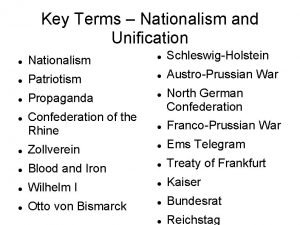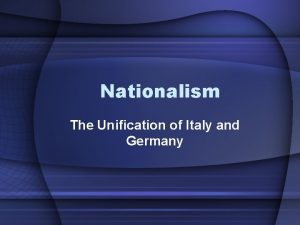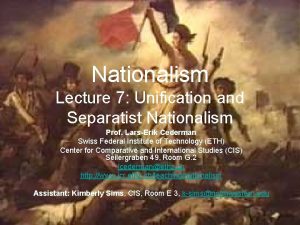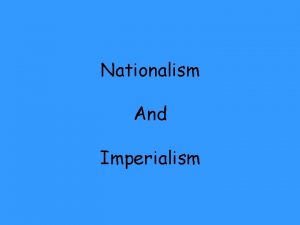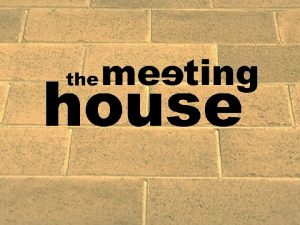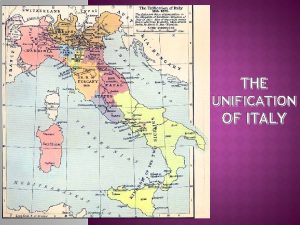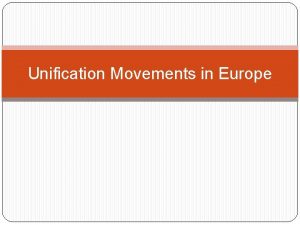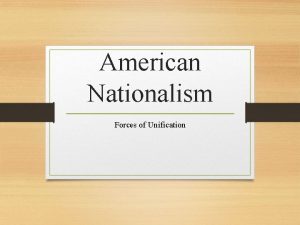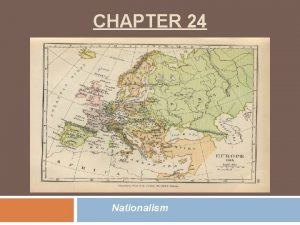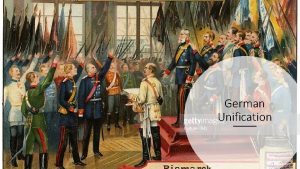NATIONALISM AND UNIFICATION Admit Slip 930 What is






















- Slides: 22

NATIONALISM AND UNIFICATION

Admit Slip 9/30 � What is nationalism? � What event did we study this year where a group of common people displayed nationalism in a violent way? � At this time in Europe, many countries and kingdoms have a foreign monarch in power. If you were a citizen of a country that had a King that was a different nationality than you and the people of your country, would you be happy? � What would you and the people of your country want instead? �

What is Nationalism? � � � Nationalism is commonly defined as a love for one's country. Historically, however, nationalism takes on a far greater meaning. Throughout history, large groups of people who share a cultural identity (language, customs, history) have felt the pulling power of nationalistic feeling. The spirit of nationalism also includes the belief that one's nation is better off as an autonomous state. Autonomy is defined as a nation governing itself independently from a centralized point. Still another aspect of nationalism is the willingness to go to extreme measures in achieving autonomous selfrule.

What is Nationalism? � � Revolutions, wars, ethnic tension, and other conflicts of varying degrees have occurred throughout history because of a love for one's country. The spirit of nationalism has shaped the histories and destinies of many countries. Nationalism can unite people into cohesive, stable nations. Likewise, it can tear nations apart which can result in long periods of social upheaval and political chaos.

Impact of the Revolutions � � � Last week we discussed the European response to the decision made at the Congress of Vienna. Many revolutions all over Europe took place due to power being restored back to the monarchs. These revolutions frightened many of the newly appointed rulers in Europe. Although many of these revolutions failed, countries in Western Europe were forever changed by the French Revolution. One country that wanted to prevent revolutionary ideas form affecting their way of life was Russia. http: //education-portal. com/academy/lesson/nationalismgrows-in-europe-timeline-events-impact. html#lesson

Absolutism in Czarist Russia � � During the French Revolution, the slogan “liberty, equality, and fraternity” was the battle cry for many revolutionaries. Russia wanted to make sure that these revolutionary ideas would not influence their own people to rebel. Unlike many of the Western European nations, Russia changed very little in the 1800’s. The Russian Empire was ruled by a czar, or ruler holding absolute power.

Life in Czarist Russia � � Russian Czars resisted reforms, fearing that change would weaken their control. Czars refused to introduce elements of democracy into their societies. Russia practiced a strict form of feudalism, where powerful landowning nobles forced serfs to work the land for little or no pay. Serfs would then owe military service to their noble if a war were to break out.

Russification � � � Russia was a vast empire with many different ethnic minorities. The czars wanted to maintain tight control over these minorities, as well as promote Russian nationalism. This policy of Russification, was an attempt to make all the different ethnic minorities living in Russia think, act, and believe as Russians. Russian Czars often persecuted non-Russians including Poles, Ukraninans, and Armenians. Russian Czars wanted one language (Russian), and one religion (Russian Orthodox).

Pogroms � � These restrictions on religion caused conflict with Jews living in Russia, Jews were not allowed to have certain jobs and were not allowed to live in certain areas in Russia. These policies encouraged violent attacks on Jews, known as pogroms. Russian authorities stood by and watched the homes of Jews burned and their businesses looted.

Exit Slip � How did Czarist Russia attempt to limit the spread of revolutionary ideas to their empire? � http: //www. youtube. com/watch? v=e. Q 7 X 01 Zkn Q 0

Admit Slip � Who was Otto Von Bismarck? � What did he believe was needed in order to unify Germany?

Unification? � What does the word unification mean? � How does the word unification relate to our discussion of nationalism?

Unification of Germany � � � In the early 1800’s, most German speaking people lived in small states, to which they felt loyalty to. After Napoleon was defeated, the once French ruled Germans wanted to be unified. Prussia was one of the small states that made up Germany, but became very powerful. Prussia set up a trade union, known as the Zollverein, and was a step toward unity. Before, German states were not allowed to trade with one another


Otto Von Bismarck � � � Otto Von Bismarck was appointed Chancellor of Prussia Bismarck was a strong, disciplined leader who played a key role in unifying Germany. Bismarck believed the only way to unify Germany was through a process he called “blood and iron”. He believed the only way to unite the German states was through war. In seven years, he led Prussia into three wars, all of which he won.

“Blood and Iron” � � � Blood represented the sacrifices the German people would have to make in achieving the goal of unification. A culture of militarism, or the glorification of the military, was created by the crafty Bismarck. This played out in a series of wars against the Austrians and the French. Iron represented the need to industrialize. Bismarck saw that in order to be a world power, Germany would have to catch up with much of the rest of Europe in the areas of technology and factory production. In 1871, Bismarck succeeded in placing Wilhelm on the throne of a unified Germany. German power achieved through nationalism would foster a period of imperialization and would set the stage for the outbreak of World War I.

Wars � � Danish War- Prussia allied with Austria and defeated Denmark Austro-Prussian War- Prussia then turned against Austria, defeating them in just seven weeks. Franco-Prussian War- Bismarck used nationalism and the bitter memories of Napoleon's conquest to stir up support for war against France. Prussia easily defeated the French In 1871, the independent German states became united with the help of Bismarck, under the rule of Kaiser William I.

https: //www. youtube. com/watch? v=1 TVp 9 Sa. Ji-4

Unification of Italy � � � The political structure of the Italian peninsula prior to 1861 was that of a split group of small kingdoms and principalities. There was no political cohesion while internal fighting and rivalries were hampering any progress. However, the people of the Italian peninsula, shared language, culture and a historical background. Some Italian leaders began calling for nationalism with the goal of bringing Italy together into a sovereign (free) nation-state with autonomous rule. The most famous of Italian nationalistic leaders were Count Camilo Cavour, Guiseppe Garibaldi, and Guiseppe Mazzini.

Mazzini � Mazzini was instrumental in being the "soul" of Italian nationalism. He also established the secret society known as Young Italy, an organization devoted to a united Italy.

Garibaldi � Garibaldi was considered to be the "sword" of Italian nationalism. His band of Red Shirts conquered forces opposed to unification and forced southern Italy into a cohesive political unit.

Cavour � Cavour (shown here) was the "brain" in his role as a skilled diplomat. Cavour successfully received aid from France in a war against the Austrians and eventually put Victor Emmanuel II on the throne of a completely united Italian nation-state in 1861.
 Https://admit.applyweb.com/admit/shibboleth/stanford
Https://admit.applyweb.com/admit/shibboleth/stanford Chapter 23 lesson 3 nationalism unification and reform
Chapter 23 lesson 3 nationalism unification and reform Nia 401
Nia 401 Trimble sps 730
Trimble sps 730 Dip slip vs strike slip
Dip slip vs strike slip Dip slip fault vs strike slip
Dip slip fault vs strike slip Dip slip fault vs strike slip
Dip slip fault vs strike slip Judge the crucible
Judge the crucible Office workers admit being rude
Office workers admit being rude Introduction of admission procedure
Introduction of admission procedure Admit note
Admit note Adjectives and infinitives
Adjectives and infinitives German and italian unification compare and contrast
German and italian unification compare and contrast National unification and the national state
National unification and the national state Prolog langage
Prolog langage Italian unification summary
Italian unification summary Sardina
Sardina Love my country
Love my country Strong devotion
Strong devotion St an
St an Unification operating model
Unification operating model Unification in first order logic
Unification in first order logic Why did germany avoid “wounding austria too severely”?
Why did germany avoid “wounding austria too severely”?
